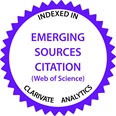Tytuł
Zintegrowane systemy informatyczne zarządzania klasy ERP – ewolucja, stan obecny i kierunki rozwoju
ORCID
Damian Dziembek: 0000-0003-0006-703X
Keywords
ERP, integrated management information systems, evolution
Słowa kluczowe
systemy ERP,zintegrowane systemy informatyczne zarządzania,ewolucja systemów ERP
Abstract
Purpose: The aim of the article is to present the evolution of ERP systems and to identify the most important directions of ERP systems development. Design/methodology/approach: The paper uses the classical literature analysis method that consists in identifying the state of the research along with a critical reflection on it (critical literature review). Based on the analysis of the literature as well as the results of reports on ERP systems, suggestions for further development of ERP systems were formulated. Findings: The dynamic development of technology, increased competition in the IT market and changing needs of enterprises will result in the evolution of ERP systems. The article shows the directions of development of ERP systems (verticalization of ERP systems, cloud ERP, mobility, internal and external integration of ERP systems, automation in ERP systems, multimedia ERP systems, process ERP systems, minimizing the implementation time of ERP systems, increased popularity of Open Source ERP systems). Research limitations/implications: The pace and scale of technological change is altering almost every area of enterprise activity. It is difficult to unambiguously assess which of the changes in the IT area will have the greatest impact on the evolution of ERP systems. Directions of ERP systems development indicated in the article are only possible proposals of changes. Originality/value: The directions of development of ERP systems outlined in the article may constitute a premise for a discussion on their further evolution in the digital economy.
Abstrakt
Cel: przedstawienie ewolucji systemów ERP oraz wskazanie najważniejszych kierunków rozwoju systemów ERP. Metodologia: w pracy wykorzystano klasyczną metodę analizy literatury polegającą na identyfikacji stanubadań wraz z krytyczną refleksją nad nim (krytyczny przegląd literatury). Na podstawie analizy literatury, a także wyników raportów dotyczących systemów ERP – sformułowano sugestie dotyczące dalszego rozwoju systemów ERP. Wyniki: dynamiczny rozwój technologii, wzrost konkurencji na rynku IT oraz zmieniające się potrzeby przedsiębiorstw będą skutkowały ewolucją systemów ERP. W artykule wskazano kierunki rozwoju systemów ERP (wertykalizacja systemów ERP, cloud ERP, mobilność, integracja wewnętrzna i zewnętrzna systemów ERP, automatyzacja w systemach ERP, multimedialne systemy ERP, procesowe systemy ERP, minimalizacja czasu wdrożenia systemów ERP, wzrost popularności systemów ERP typu open source). Ograniczenia/implikacje badawcze: tempo i skala zmian technologicznych zmienia niemal każdy obszar aktywności przedsiębiorstw. Trudno jednoznacznie ocenić, które ze zmian w obszarze IT będą miały największy wpływ na ewolucję systemów ERP. Zasygnalizowane w artykule kierunki rozwoju systemów ERP są jedynie możliwymi propozycjami zmian. Oryginalność/wartość: nakreślone w artykule kierunki rozwoju systemów ERP mogą stanowić przesłankę do dyskusji na temat ich dalszej ewolucji w gospodarce cyfrowej.
Recommended Citation
Dziembek, D. (2021). Integrated ERP-Class Management Information Systems – Evolution, Current State and Development Directions. Problemy Zarządzania, 19(93), 187-210. https://doi.org/10.7172/1644-9584.93.10
First Page
187
Last Page
210
Page Count
23
DOI
10.7172/1644-9584.93.10
Publisher
University of Warsaw







